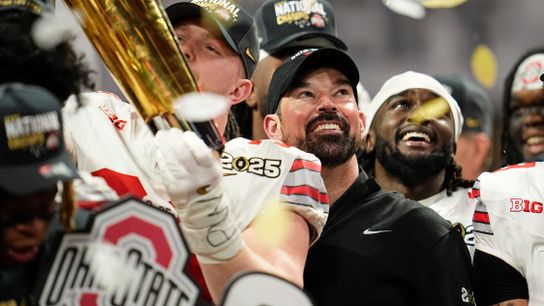When you stop and think about it, Ryan Day's third season as Ohio State's head coach was his worst. It was the first time his Buckeyes outfit did not win the Big Ten, reach the College Football Playoff, or end the year in the AP top-5. All they did was go 11-2, win the Rose Bowl, and finish a distant sixth in the AP.
Day worked decisively to remake his defensive staff, led by new coordinator Jim Knowles, and returns a team that will be ranked No. 2 to begin the 2022 season, led by the best-in-class duo of quarterback CJ Stroud and wide receiver Jaxon Smith-Njigba. At 34-4 as the head coach (37-4 if you include his 3-game stint replacing Urban Meyer), Ohio State's brass was confident enough in Day's "down" 2021 to lock him up through 2028 with a salary averaging $9.5 million a year.
The new deal will take Day through his 10th season as Ohio State's head coach (and 12th overall in Columbus), by which point he'll only be 49 years old. By that point, Day will have enough money in the bank he'll never have to work again, or he could try his hand at the next level, or he could continue building upon Ohio State's run of success dating all the way back to Woody Hayes' hiring in 1951. (Of Ohio State's six head Buckeyes since Hayes' hiring, the lowest winning percentage is John Cooper's .715.)
In an interview with 97.1 The Fan in Columbus, Day did a good job of saying he intends to remain at Ohio State for the long haul without verbally handcuffing himself to his desk.
"First off, there's just so many people to thank when something like this happens. This is obviously a wonderful place. And like I said before, I want to be here as long as I possibly can and our family loves Columbus," Day said. "So we are just very blessed and thankful for so many that have made something like this possible."
Ryan Day @ryandaytime (OSU football coach) 5-25-22 https://t.co/fGx6Y0NivK
— Morning Juice (@MorningJuice971) May 25, 2022
Given that he arrived to Columbus from the San Francisco 49ers, many typecast Day as an "NFL guy," but in reality, one season in San Francisco and one in Philly represent the totality of his NFL experience. He finished playing at New Hampshire in 2001 and immediately went to work at his alma mater upon graduation, remained in the college game until 2014, and returned in 2017.
Aside from the aforementioned Cooper, Ohio State football has operated under the same blueprint for seven-plus decades now. The Buckeyes choose a head coach with prior ties to the program or to the state of Ohio, that coach wins (at least) three of every four games, and he stays for as long he can.
Point being: Day may take an NFL job someday, but doing so would represent a change in his material circumstances, not a personal manifest destiny.
And so if you're a Matt Campbell, a Luke Fickell, or any other successful FBS head coach who grew up in Ohio undoubtedly dreaming of leading the Buckeyes out of the Ohio Stadium tunnel, it's time to focus on Career Plan B if you haven't already.
